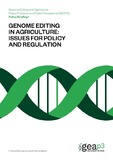Genome Editing and Agriculture: Policy, Practices and Public Perceptions (GEAP3) Policy Briefing 1: Genome Editing in Agriculture: Issues for Policy and Regulation

Download
Date
2020-09Author
Glover, Dominic
Friedrich, Beate
Ely, Adrian
Metadata
Show full item recordImpact
Abstract
Genome editing, also known as gene editing, is a technique of genetic engineering that involves the alteration of an organism’s genetic structure by adding, deleting, changing or replacing individual nucleotides or sequences of DNA. Genome editing includes several different methods and tools, which can be used by breeders to alter the traits of crop plants and livestock animals. Genome-edited crops and food products are beginning to be commercialised, which raises questions around how the techniques and products of genome editing should be governed.
This briefing explains why the governance of genetic engineering is a topic of public interest and concern. It considers whether genome editing raises new issues relating to environmental and food safety, intellectual property rights or trade, and why genome editing applications may provoke public controversy. In particular, it discusses whether regulations and policies to govern the techniques, applications and products of genome editing should be any different from those applied to the previous generation of genetic engineering technology.
Is part of series
Genome Editing and Agriculture: Policy, Practices and Public Perceptions (GEAP3) Policy Briefings;1Rights holder
Genome Editing and Agriculture: Policy, Practices and Public Perceptions (GEAP3) NetworkRights details
http://creativecommons.org/licenses/by/4.0/Sponsor
Dalhousie UniversityCollections
- ESRC STEPS Centre [225]

